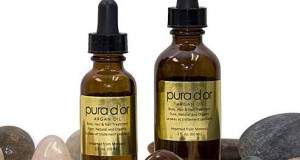
Photo credit: wikimedia
The use of walnut oil for skin is often recommended. Walnut oil is edible oil pressed from the walnuts. The oil is expensive so it is not very widespread in culinary use. As walnut oil contains a lot of beneficial nutrients it is highly useful for skin.
Walnut oil composition
Walnut oil is a rich source of unsaturated fatty acids as Wikipedia states. Omega-6 polyunsaturated fatty acids, omega-9 and especially omega-3 fats found in the oil contribute to the skin health greatly. Walnut oil contains vitamin E and ellagic acid, strong antioxidants essential for the skin cells. Moreover, it is high in minerals such as calcium, zinc, magnesium, selenium, copper and phosphorus.
SEE ALSO: Is it Possible to Use Castor Oil for Everyday Skin Care?
Benefits of walnut oil for skin
As walnut oil is a source of nutrients the application of walnut oil on skin brings a range of benefits for the skin:
- Moisturizing: unsaturated fatty acids deeply moisturize the skin. They penetrate the cells and lock the moisture inside. They don’t leave greasy traces on the skin. Walnut oil dries quickly and makes the skin well-lubricated. Thus, it can be used for a dry skin and dry problematic areas of any type of the skin. Moreover, the oil is a wonderful remedy for dry elbows and knees. It soothes the skin and evens it. Read also about a coconut oil moisturizer.
- Anti-aging: according to Wikipedia antioxidants present in walnut oil, such as gamma-tocopherol and ellagic acid, protect the cells membranes of the harmful impact from outside. They help the body combat free radicals and stop the process of aging. So the oil not only helps prevent wrinkles, it can also help you get rid of fine lines and small wrinkles.
- Healing: walnut oil is believed to have an antifungal effect. When we apply walnut oil skin infections like athlete’s foot and the Candida can be alleviated. For better results add a few drops of tea tree oil or a clove of garlic or some black walnut oil to walnut oil to increase the effectiveness of the oil. Tea tree oil is a perfect choice for athlete’s foot. Remember that natural remedies needs more time to have an effect. It will take several weeks to get rid of skin infections. Besides, the oil can be used to treat eczema. Omega-3 fatty acids in walnut oil reduce the inflammation and fatty acids soothe the dry skin. According to the University of Maryland Medical Center omega-3 fats present in walnut oil may lessen the symptoms of psoriasis. However, more clinical studies are needed to prove this.
RELATED: A Step-to-Step Guide How to Make Walnut Oil
Application of walnut oil for skin treatment
Walnut oil is used topically on any part of the body. Walnut oil can act as:
- Bath oil
- Massage oil
- Anti-wrinkle and night cream
- Body lotion
- Lip balm
Add a few drops of walnut oil to your bath. The oil will soothe your skin and protects it from the moisture loss. Walnut oil is widely-used as massage oil. It is easily absorbed and dries well. In aromatherapy the oil is considered to have a calming effect that helps balance the nervous system. Walnut oil can be applied on your face every night before you go to bed. Sometimes it is added to cosmetic products for skin care to better their effect.
 Oilypedia.com – Benefits And Uses Of Supplemental and Essential Oils
Oilypedia.com – Benefits And Uses Of Supplemental and Essential Oils 


